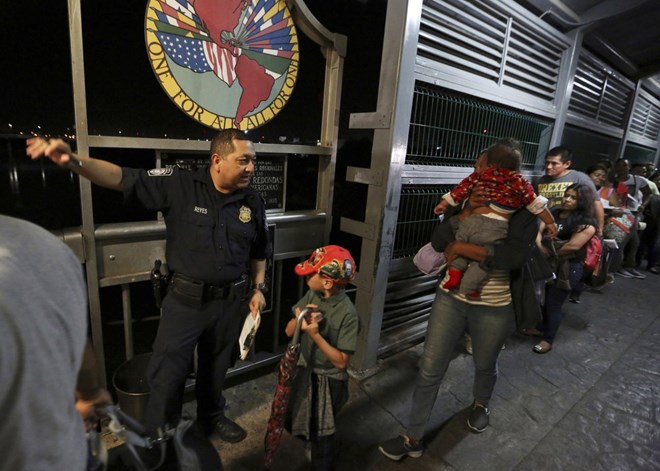
By Julian Resendiz
Saturday September 26, 2020
Agency will provide over-the-phone contractors to preserve social distancing; advocates call for videoconferencing to include attorneys

A U.S. Customs and Border Protection officer directs asylum seekers at the Laredo, Texas, port of entry. (AP file photo)
EL PASO, Texas (Border Report) – Asylum seekers won’t be able to bring a trusted interpreter to their application interview for the next six months, but the federal government vows to provide a free telephone alternative.
In a temporary final rule to be published on Wednesday, U.S. Citizenship and Immigration Services says that for the next 180 days it will provide contract interpreters to speakers of Spanish and 46 other languages who come in for affirmative asylum interviews. The rule put in place to prevent the spread of the coronavirus will be in effect from Sept. 23 to March 23, 2021.
“By providing telephonic contract interpreters, the risk of contracting COVID-19 for applicants, attorneys, interpreters, and USCIS employees will be reduced by requiring fewer people to attend asylum interviews in person,” the agency’s new regulation states. “In addition, it may alleviate an applicant’s challenge in securing an interpreter (and) USCIS may be able to conduct additional asylum interviews because there will be more physical office space that will not be occupied by interpreters.”Previously, if the asylum seeker didn’t bring an interpreter and couldn’t speak English, his or her affirmative action hearing was rescheduled, which meant a longer wait for the petitioner.
Now, you can only bring in your own interpreter if your native language isn’t on the list of 47, which include anything from Farsi to Somali and Haitian creole.
The affirmative asylum hearing includes an in-person interview and the filing of a paper application with USCIS. It usually takes place some time after the asylum seeker has presented himself or herself at a port of entry to seek protection from persecution in another country.
Contract interpreters undergo background checks and competency tests; some of them already provide screening interviews at the border, monitor interpreters brought in from the outside and already occasionally jump in during affirmative asylum interviews, as needed, the federal agency says.
Migrant advocates in El Paso said they welcome efforts to protect their clients’ health as long as their due process is not affected.
“I think it’s positive for the people that we serve. It’s a good move to provide these contract interpreters that are paid for by the government,” said Linda Rivas, executive director for Las Americas Immigrant Advocacy Center in El Paso. “I would like for them to take it a little bit further because here the attorneys have not always been successful in getting access over the phone. That is something we are interested in.”
Rivas urged not just USCIS but all federal agencies that deal with immigration matters to look into expanding their technology to include videoconferencing.
“While we know nothing replaces one-on-one contact on this situation, out of an abundance of caution I think all government offices that deal with immigration, including USCIS, should really be looking at video accessibility that would help counsel have better access to their clients,” she said.